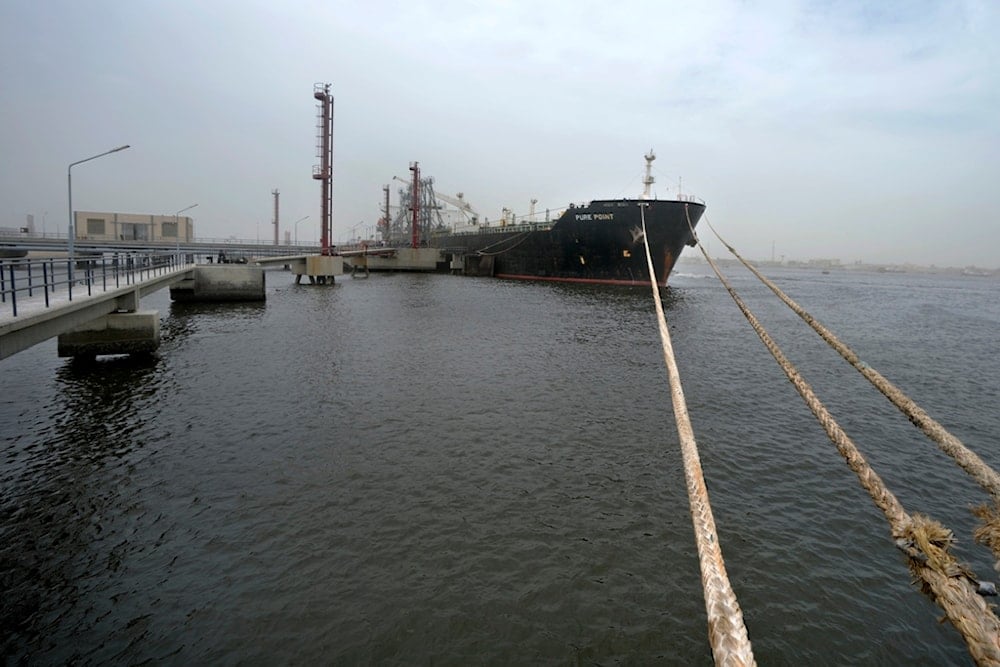India refuses to yield on Russian oil amid US-EU sanctions: Analysis
India is resisting mounting pressure from the US and EU to cut ties with Russian oil, as its economy remains heavily reliant on discounted crude, despite the threat of sanctions and tariffs.
-

A Russian oil cargo carrying discounted crude, is anchored at a port in Karachi, Pakistan, Tuesday, June 13, 2023. (AP)
Russian news outlet Izvestia published an analysis on Saturday, detailing that tensions between India and the West have escalated over New Delhi's continued reliance on Russian oil, with both the United States and European Union ramping up punitive measures. Despite growing pressure, India remains unlikely to sever energy ties with Moscow due to its deep dependence on discounted crude to fuel economic growth.
In recent weeks, Washington and Brussels have moved to penalize India for importing and refining Russian oil. The European Union's 18th package of sanctions, introduced in July, included a clause prohibiting the purchase of petroleum products refined from Russian crude. While the document does not specifically mention India, the country is a known hub for refining Russian oil and exporting diesel. particularly to Europe. In the first quarter of 2025 alone, India and Turkey imported 1.8 million barrels per day from Russia, with 450,000 barrels a day re-exported to the EU as diesel.
In a more targeted move, the EU also placed sanctions on Nayara Energy, an Indian firm that operates the country's second-largest refinery. The company's Vadinar plant is nearly half-owned by Russia's state-run oil giant Rosneft, already under Western sanctions. European authorities accused Nayara of "providing substantial income to the Russian government."
Across the Atlantic, US President Donald Trump took a sharper stance. Initially voicing support for a Senate bill proposing 500% tariffs on nations purchasing Russian energy, primarily aimed at China and India, he later threatened to impose secondary sanctions of 100% on such imports himself unless a peace agreement on Ukraine was reached within 50 days. Ultimately, he settled on a 25% tariff targeting Indian goods, effective August 1. Trump cited India's energy and defense ties with Russia, a trade surplus with the US, and "high barriers imposed by New Delhi on American goods" as justification for the move.
Read more: US threatens new tariffs on Russian oil buyers after Moscow ultimatum
Tariff Standoff
India finds itself in a complex position. It maintains a trade surplus with Western countries but suffers a deficit in exchanges with Russia and Gulf oil exporters. Combined with Trump's broader grievances about unfair trade practices, this imbalance makes India an attractive target for US pressure.
However, New Delhi's protectionism stems from structural vulnerabilities. Its rapidly expanding economy still relies heavily on affordable foreign oil. The prospect of US tariffs threatens a development model based on exporting low-cost goods to Western markets as a substitute for Chinese imports. While India may seek to soften the impact through negotiation, its overall exposure is limited. Washington is a key partner, but not indispensable, and India may be prepared to weather trade friction, especially since Trump had signaled tariff intentions since the start of his second term.
Shortly after Trump's announcement, several state-owned Indian refiners, Indian Oil Corp, Hindustan Petroleum, Bharat Petroleum, and Mangalore Refinery, reportedly halted purchases of Russian crude, opting instead for spot market deals with suppliers in the UAE and West Africa. These entities collectively manage about 60% of India's refining capacity.
Oil Dependence
Still, Russian oil remains the backbone of India's recent economic success. It has enabled India to challenge China's growth rate and capitalize on the industrial slowdown in sanction-hit Western economies. Izvestia notes that "oil from Russia is the foundation of the Indian economy, which makes it impossible to completely abandon it."
Analysts expect the recent pause in Russian imports to be temporary, part of a broader strategy to reduce friction with Western partners. Izvestia suggests India will eventually resume Russian oil purchases, possibly via indirect channels, while using the interim period to negotiate more favorable terms.
A full pivot to higher-priced oil alternatives would not only slow India's growth but also risk social upheaval. "Given how poor most of the country's population is," the article warns, "this can cause real unrest and social tension." For Prime Minister Narendra Modi's government, maintaining access to cheap Russian crude remains a political and economic imperative.
Read more: India scraps F-35 deal with US as Trump slaps tariffs

 4 Min Read
4 Min Read










